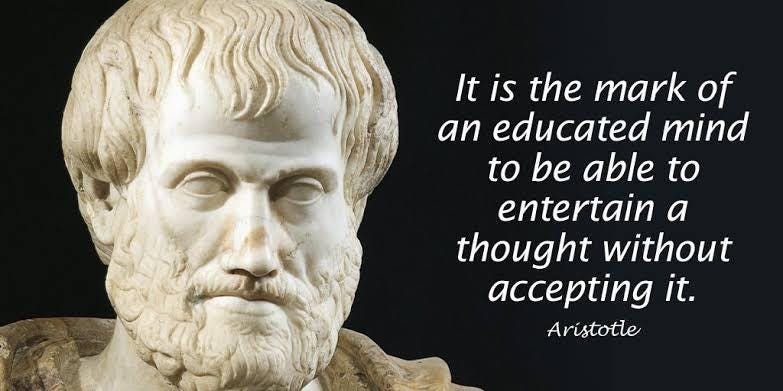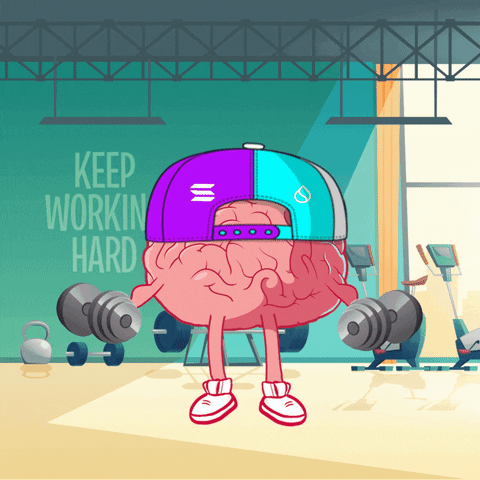Metacognition: Thinking of our Thoughts and 4 Exercises to Improve Learning
Thinking With Intention, Understanding Enhanced Learning, Emotional Regulation, and Problem-Solving through Self-Awareness
Weekly exploration of ideas and tools to live with intention, creating a more fulfilling and happier life.
Aristotle’s quote, “It is the mark of an educated mind to be able to entertain a thought without accepting it,” highlights what it means to think critically. It's about being able to consider different ideas and viewpoints without immediately taking them as your own. This shows a level of intellectual maturity and openness, where understanding and exploring ideas is more important than just agreeing or disagreeing with them right off the bat.
The quote points to the value of not rushing to judgment. When you entertain a thought, you’re essentially taking it for a test drive – examining its truth, thinking about its consequences, and understanding it in its wider context, all without committing to it. This kind of thoughtful consideration requires a more sophisticated level of thinking, where questioning and analysis take precedence over simple acceptance.
Aristotle’s idea is incredibly relevant today because it ties into metacognition. It is said that we have an average of 60,000 thoughts a day, and our brains process more and more external stimuli daily as our world grows increasingly complex.
Over the past few weeks, I have been struck by the amount of new information and ideas that people process. From politics and taxes to diets and exercise, I was interested in how the people I talked to determined what they believed to be true.
So today, I want to explore metacognition and metacognitive frameworks.
Metacognition, or thinking about your own thinking, involves actively managing and regulating your thought processes. It's about being aware of how you learn and make decisions and tweaking those processes as needed. This self-aware approach helps us handle the complex flow of information in modern life, making it easier to sort through various perspectives and critically assess info before we decide to believe it. In this way, metacognition empowers us to engage with ideas deeply, much like Aristotle suggests, fostering a broader understanding before we choose to accept any thought as true.
Today’s Flow
History of Metacogition
Practical Approaches and Metacognitive Tools
Self Explanation
Emotional Awareness
Monitoring Progress
Teaching Others
Conclusion
Let’s explore.
The History of Metacognition
The concept of metacognition has roots that stretch back to ancient philosophies, with early mentions found in the works of philosophers like Aristotle. However, it wasn’t formally defined in psychological terms until the late 20th century. The term "metacognition" was coined by developmental psychologist John H. Flavell in 1976. Flavell described metacognition as "knowledge concerning one's own cognitive processes and products or anything related to them," [1] which includes knowledge about when and how to use particular strategies for learning or problem-solving. His work initiated a wave of research and interest in how self-awareness of one’s cognitive processes is crucial for effective learning and intelligent behavior.
As the study of metacognition evolved, researchers began to outline more areas and components, such as metacognitive knowledge (awareness of one’s cognitive processes and how the brain works), metacognitive regulation (the ability to oversee, regulate, and direct learning), and metacognitive experiences (reflection and how one feels about the cognitive tasks they engage in).
The 1980s and 1990s saw a big increase in interest in how metacognitive abilities affect learning across diverse fields, from education to psychology to newer concepts like artificial intelligence. This era led to the development of numerous educational strategies or tools aimed at enhancing metacognitive skills among students (which we will get into shortly), recognizing that these skills significantly improve academic performance.
There are many leading researchers and scientists in the field of Metacognition, but I want to highlight a few key leaders below. Each of these scientists has made significant contributions to understanding and developing metacognitive theories, which my summaries will not do justice to, but I hope I can still give you a directional understanding if you want to learn more. :)
John H. Flavell - Often regarded as the pioneer in the field, Flavell was the first to formally introduce the term "metacognition" in the 1970s. His work laid the foundational concepts of metacognitive knowledge and metacognitive regulation, which have shaped much of the subsequent research in the field. [2]
Ann Brown - Brown was influential in applying metacognitive theory to educational settings, particularly through her research on "reciprocal teaching," a technique that enhances students' understanding by having them teach each other. She also studied the role of metacognition in problem-solving and its development in children. [3]
David W. Schunn - A cognitive psychologist who has extensively researched the role of metacognition in writing, science, and engineering. His work emphasizes the importance of metacognitive skills in complex cognitive tasks and creative processes. [4]
Jennifer A. Livingston - Known for her work in metacognitive knowledge and regulation, Livingston has contributed to the understanding of how metacognitive skills can be effectively taught and assessed, particularly in educational contexts. [5]
Marsha C. Lovett - Lovett's research focuses on metacognition in higher education, especially in science and mathematics. She has explored how teaching students to be metacognitively aware can improve their learning and problem-solving abilities. [6]
These researchers have all contributed to the broader understanding of metacognition, emphasizing its importance in cognitive development, educational achievement, and efficient learning strategies. They are often referenced in modern studies due to the frameworks they established for others to build on.
What is exciting today is that metacognition is still a vital area of study in cognitive psychology. It is influencing teaching methods and learning approaches worldwide and providing insight into how we can all become more effective learners by understanding and adjusting our own cognitive processes.
Practical Approaches and Metacognitive Tools
We’ve come a long way in understanding metacognition since Flavell first coined the term back in the 1970s. Now, since we have explored the foundation of metacognition, it's time we explore how it's turned into practical tools we can all use. There are four main starting points that I want to explore—self-explanation, emotional awareness, monitoring progress, and teaching others. These are practical ways to engage with these theories and reap the benefits of being more aware of our thoughts.
Let’s take a look at how each of these can help us learn better and tackle challenges more effectively.
Self-Explanation
Self-explanation is a powerful metacognitive strategy where you explain to yourself what you’ve learned or are trying to understand. It’s like being your own teacher. When practicing self-explanation, you go through the material and then pause to articulate, either out loud or in writing, what it means and how it connects to what you already know. This process helps clarify your thoughts, reinforces learning, and can uncover any gaps in your understanding. For someone new to this practice, start with a topic you've recently read about or a problem you’ve solved, and try to explain it as if you are teaching it to someone else who isn’t familiar with the topic.
I have found this practice particularly useful when I am listening to podcasts. There is a ton of expert content squeezed into 1-3 hour episodes from some of our favorite thought leaders. Although I would love to put all the recommendations in place, I know that is unrealistic. Instead, when something stands out to me as in the top 10th percentile of recommendations, I will often pause and write down quotes from these sections and relisten to the section 2-3 times. This helps me set a base understanding, then I follow it with an attempt to explain to myself what I just learned.
A recent example of this was a discussion I was listening to about cold exposure therapy (which I am a huge fan of) and the different strategies and techniques for making it effective for your desired outcome. I have always let my body heat up naturally after ice baths, as I know that amplifies the production of oxytocin and serotonin, which stimulates mood regulation. However, in this discussion, the host was talking about how going into a sauna afterward is beneficial for dilation in the blood vessels, which aids in getting nutrients and oxygen to your muscles for recovery and the removal of waste products like lactic acid.
I listened to this podcast section three times and explained the science to myself. It took me a few tries to solidify how the process worked and what temperatures and timing were optimal, but eventually, I got it. I have now taken it as an additional way to engage with something that is part of my regular routine if needed. Had I not taken the moment to pause and engage with the material and ensure I could explain it to myself, it would likely have gone in one ear and out the other.
Emotional Awareness
Emotional awareness in the context of metacognition involves recognizing and understanding your emotional responses in relation to your learning or problem-solving processes. It’s about noticing how you feel when you encounter challenges or make progress, and considering how these emotions affect your thinking. For beginners, a good way to practice this is to pause during a learning session and reflect on your current emotional state. Ask yourself questions like: How do I feel about the material I’m learning? Am I frustrated, confused, excited? Acknowledging these emotions can help you manage them more effectively and see how they influence your ability to absorb and process information.
Last week, I was in back-to-back meetings, and my mood started to take a toll. I was getting hungry and tired and realized I had started to become irritable. I took a moment to reflect on this, even though I had an additional hour left of meetings before I would have a moment to eat and get up for a walk.
I joined my next call, and it started with a minor issue that would ultimately need my time to resolve. Internally, I was getting frustrated about what I thought was a clear answer to the problem of my co-worker, but I could tell that my own emotions were affecting my judgment. Rather than immediately reacting to the situation with the heightened emotion that I had identified before the call, I asked if we could set up 30 minutes the following day to do a deep dive and not further discuss it at that moment.
The next day, I ensured that I had the mental capacity to deal with the issue ahead of time and that I was not letting my clouded emotions affect my ability to work with an employee and any potential coaching that could come from it. The solution was resolved in 15 minutes instead of 30, and I felt better after not letting myself get too worked up the day before.
Monitoring Progress
Monitoring progress is a key metacognitive practice where you regularly check how well you are doing towards achieving your learning goals. This involves setting specific objectives at the start and then assessing your performance as you progress. To start monitoring your progress, you can keep a simple journal or checklist of your study sessions or project milestones. After each session or at the end of the day, write down what you accomplished and compare it to what you planned. Reflect on any difficulties you encountered and consider what adjustments might be needed to improve your learning efficiency or problem-solving strategies.
I use this strategy every week while writing “With Intention.” When I first started, writing the first post took me nearly 12 hours. My goal is to be able to do my research and articulate myself in 5 hours per topic. This takes adjustments of approach, understanding, and deliverables to achieve that outcome. After 2.5 months, I find myself consolidating my thoughts, setting the framework, and creating an exploration in 6 to 8 hours. To me, this is progress. I understand how to frame a discussion, convey my point, and be more articulate than I was before.
This also goes along with creating the brand of “With Intention”. I have refined how I approach topics of exploration, handle all the feedback I get, and ensure I am thinking about my long-term goals when it comes to this. I enjoy having this space outside of my day-to-day working life as it means I can set my own goals at my own pace to ensure I am using this time and learning in a way that works best for me. Tracking my progress with this space has also allowed me to transfer my frameworks for success into other spaces such as work as well.
Teaching Others
Teaching others is a metacognitive strategy that involves explaining concepts or information you have learned to someone else. This practice can significantly deepen your own understanding and reveal any areas where your knowledge might be lacking. If you’re new to this, look for opportunities to explain a recent topic you’ve studied to a friend, family member, or even just to yourself in the mirror. Try to make your explanation clear and simple, which will help you organize your thoughts and solidify your grasp of the subject. Teaching is not just about transferring knowledge; it's a dynamic way to engage with content and reinforce your own learning.
Today, try explaining metacognition to someone around you.
What have you learned? Can you articulate one theory and one practice? What are spaces still a little fuzzy? You can always return to this article, practice the information, and go back to articulating the concept to a new person to help solidify your understanding.
Conclusion
It’s about being more aware of how we learn, make decisions, and even how we react to new information. This self-awareness is super useful because it helps us sort through the daily barrage of ever-increasing information and ideas we face day-to-day.
Self-explanation involves teaching yourself by summarizing what you’ve learned in your own words. Emotional awareness is recognizing how your feelings affect your thinking, especially when you’re stressed or learning something new. Monitoring progress involves setting personal benchmarks and regularly checking how you’re doing against them. Lastly, teaching others is a powerful way to solidify your own understanding and uncover areas where you might need more clarity. Together, these tools not only enhance our learning capabilities but also help us lead more intentional and reflective lives.
Thank you for joining me for this week’s exploration on metacognition. I look learning with you next week.
With intention,
Brian
Sources
[1] https://my.chartered.college/impact_article/using-evidence-based-practices-that-support-metacognition/
[2] https://www.amacad.org/person/john-hurley-flavell
[3] http://texts.cdlib.org/view?docId=hb1r29n709;NAAN=13030&doc.view=frames&chunk.id=div00007&toc.depth=1&toc.id=&brand=oac4
[4] https://www.cmu.edu/dietrich/psychology/directory/emeritus/klahr-david.html
[5] https://eric.ed.gov/?id=ED474273
[6] https://serc.carleton.edu/NAGTWorkshops/metacognition/teaching_metacognition.html









